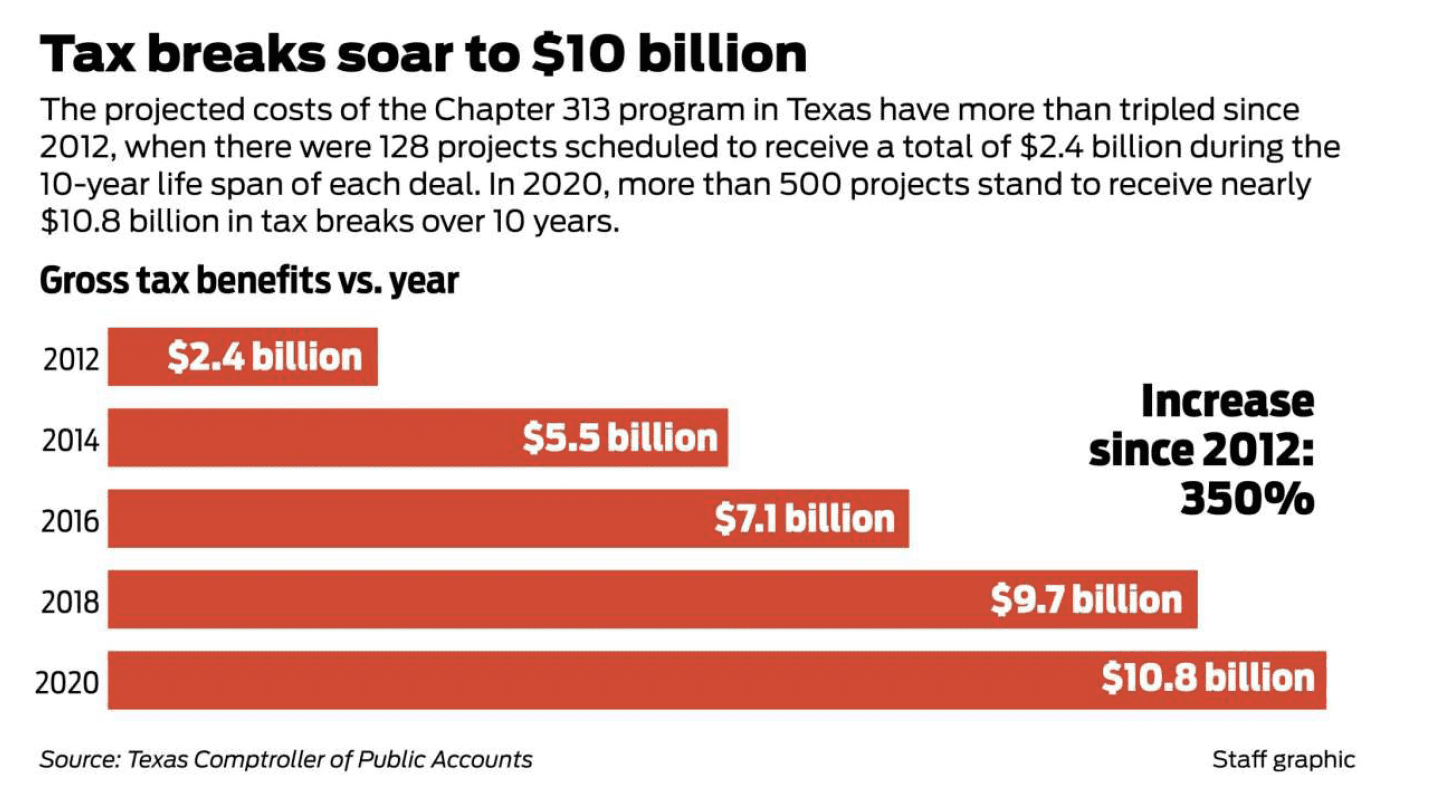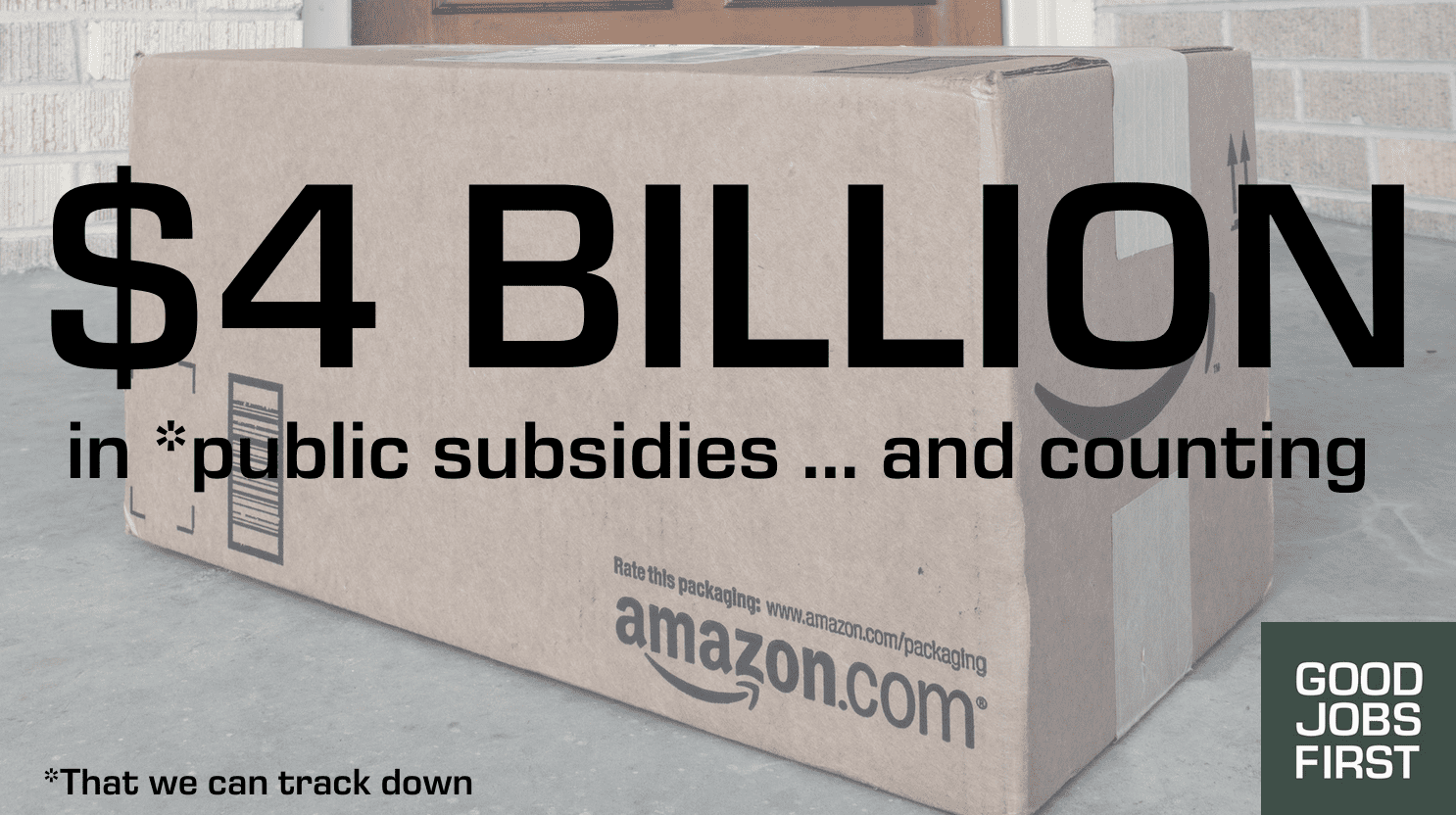Happy nearly summer, Good Jobs First friends. This is Arlene, with a much overdue update on what we at Good Jobs First have been up to this very busy spring.
Let’s start with some huge news out of Texas, where a massive corporate subsidy program is now on track to expire next year. The program is called Chapter 313, and an explosive Houston Chronicle series (paywalled!) found how little Texans get from a program that costs them over $1 billion per year.
That’s $1 billion that could be used to bring teachers, nurses and counselors to public schools – our recent report found 52 Texas public school districts lost more than $1,000 per pupil per year to corporate tax abatements; 18 of those lost more than $6,000.
The $1 billion could also fix potholed roads or build affordable housing, or I don’t know, help make sure households have heat when there’s a snowstorm.

Its demise is thanks to a hard-charging assortment of groups that came together across political lines to oppose this terrible program, including the libertarian-minded Texas Public Policy Foundation, the progressive Every Texan, 13 community organizing affiliates of the Industrial Areas Foundation, organized labor and others.
Organizer Broderick Bagert of Together Louisiana , which has been helping that state reduce its own destructive corporate welfare program that, like in Texas, mostly benefits the oil and gas industry, hopes this is just the beginning.
“In a lot of cases, it’s not that these battles have been lost — they just haven’t been fought,” he told The Intercept . “What you’re seeing for the first time is the battles being fought.”
But don’t expect supporters of Chapter 313 to quietly go away. Their propaganda machine is hard at work , claiming Texas will lose future investment. Of course, oil and gas production happens where there is feedstock in the ground; tax breaks are not a site location basic.
As the Chronicle investigation so well showed, each job the program creates costs $211,600 (a conservative estimate), fewer than 2.5 percent of applications were ever denied, and only one company ever had to pay back subsidies, despite dozens failing to meet job creation and wage agreements.
The war may not be over, but this group of Texans won the Battle of 313. And they’re watching and ready for what comes next.
“The defeat of these bills sends a strong statement that Texas will not underwrite the bottom lines of corporations on the backs of Texas schoolchildren and taxpayers,” the Rev. Miles Brandon, a leader with Austin Interfaith, an IAF affiliate, told the Chronicle .
Stay tuned.
Join Us, Live with Amazon Book Author Alec MacGillis
This evening (Tuesday, June 15), I’ll be part of a conversation about Amazon with journalist Alec MacGillis, author of the just-released “ Fulfillment: Winning and Losing in One-Click America .” The book details the growing gap between winning and losing regions, and how Amazon not only exacerbates the trend but exploits it to its advantage. I’ll talk about how communities can use their power to demand Amazon do better for its workers and the environment and pay for roads, schools and other infrastructure demands its presence brings.
- We start at 5 p.m. PT/8 p.m. EST. Sign up here for the event , sponsored by Our Revolution, Good Jobs First and many others.
On Friday, June 18, our research director Phil Mattera returns to the Investigative Reporters & Editors Conference to demonstrate our Covid Stimulus Watch database and how to dig into the CARES Act, the biggest relief package in U.S. history. Learn how to track fraud, identify lapses in oversight and uncover inequitable spending, including finding corporate recipients with spotty records and finding disparities in pandemic education funding.
Phil will be joined by Washington Post’s Ziva Branstetter, NBC’s Andy Lehren and the Project on Government Oversight’s Sean Moulton.
- This one’s at noon PT/3 p.m. EST. Add it to your #IRE21 schedule.
Speaking of stimulus dollars, Good Jobs First just identified 22 companies involved in detention operations and prison contracting that received loans totaling more than $47 million from the Paycheck Protection Program (PPP).
The companies include three that house ICE detainees, three prison transportation companies, 12 correctional health care providers, and four youth detention center operators. Read the full analysis here .
Opportunity Zones Still Aren’t Working
The Opportunity Zone program, touted as a way to drive private investment into low-income communities by offering big tax breaks, isn’t working, writes Aaron Seybert of the Kresge Foundation. Zones need transparency and to center the voices and needs of communities, or they need to go. “OZ is just the latest example of policymakers and investors doing something to low-income communities rather than with them,” he writes.
Indeed, a recent study by two Berkeley researchers found most OZ investments went to areas that would have grown anyway (read: already gentrifying neighborhoods). Plus, wealthy private investors aren’t the solution to boosting blighted neighborhoods – the solution is public investment, writes Build Baton Rouge CEO Christopher J. Tyson at Bloomberg CityLab .
Amazon’s Highly Profitable. So Here’s Another (Public) Dollar

We recently revealed Amazon has now received more than $4 billion in public subsidies in the U.S., a tally that keeps growing despite its pandemic riches. So far in 2021 alone , it has received at least $594.6 million, Good Jobs First research analyst Kasia Tarczynska found. I wrote about what residents can do to turn the tables. Amazon should be paying communities for locating in them, not the other way around.
- Explore all of Amazon’s deals here .
Our Worsening Corporations
In 2004, Joel Bakan wrote a book about the dangerous grip corporations hold over people and institutions, and how government has aided and abetted their dominance. Now he’s back with another book, “The New Corporation: How ‘Good’ Corporations are Bad for Democracy.” And a new film, “The New Corporation: The Unfortunately Necessary Sequel.”
I reached out to Bakan to tell me what inspired the sequel and what can be done to weaken corporations’ dominance in society. Here’s our conversation, in five questions.
Work With Us
We’ve got an immediate opening for a research analyst to guide our work tracking federal spending related to the pandemic. It’s a great opportunity for someone with federal policy experience who loves using data to tell stories, hold corporations and government accountable and wants to drive positive change for working families and communities.
- See the full job description and salary information here.
That’s the word for now. Until next time!